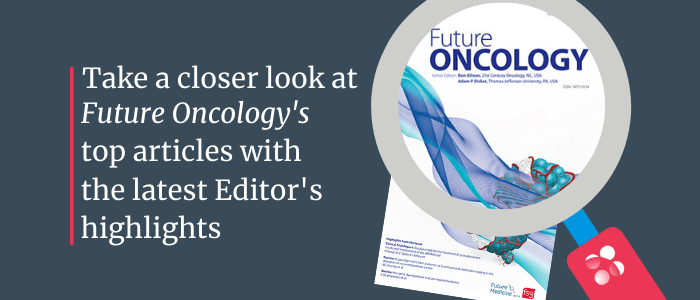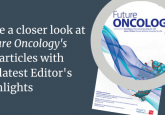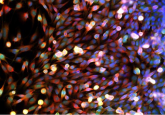Top 5 Future Oncology articles – June 2021

In this latest instalment of his regular monthly column, Louis Gautier, Commissioning Editor of Future Oncology, exclusively shares his top 5 peer-reviewed articles from the recent journal issues, which we have made freely available for you, Oncology Central members! Check out Louis’ highlights below.
Highlights of the San Antonio Breast Cancer Symposium 2020: Part 1
The annual San Antonio Breast cancer Symposium (SABCS, 8–11 December 2021; Virtual) is designed to provide state-of-the-art information on the experimental biology, etiology, prevention, diagnosis, and therapy of breast cancer and premalignant breast disease. Each year, the conference attracts thousands of oncologists from across 80 countries, but this year stood out as the first time the conference had been presented virtually in light of the ongoing COVID-19 pandemic. John Benson (a recent addition to Future Oncology’s Editorial Board) and his colleagues send us their summary of the symposium every year and, in this two part report, explain the key findings that were presented.
In Part I, Benson et al. discuss presentations from Deborah Doroshaw (Icahn School of Medicine at Mount Sinai, NY, USA) on the management of breast cancer patients during the COVID pandemic; Ian Kunkler’s (University of Edinburgh, Scotland) presentation of updated results from the PRIME II trial that is investigating the omission of radiotherapy after breast-conserving surgery; and Reshma Jagsi’s (University of Michigan, MI, USA) discussion of physician behavior and racial disparities in the treatment for breast cancer.
Part II focuses on the newer treatments that were presented at the conference, including CDK4/6 inhibitors in early-stage breast cancer, indirect suppression of MYC via immunotherapy and results of the DESINTY-Breast01 trial investigating the anti-HER2 therapy trastuzumab deruxtecan (Enhertu®) in unresectable or metastatic HER2-positive disease.
Pharmacotherapy for liposarcoma: current and emerging synthetic treatments
Liposarcoma is a rare form of soft tissue sarcoma, management of which is still rooted in surgery and systemic chemotherapy. Unsurprisingly for such a rare disease, outcomes are consistently improved when patients are treated at specialist centers, such as the Royal Marsden Hospital (London, UK), which partners in research with the Institute of Cancer Research (London, UK). In this review, Robin Jones and his colleagues from both institutions review the landscape of treatments for liposarcoma and discuss the future of targeted therapy.
They begin by reviewing doxorubicin (Adriamycin®), trabectedin (Yondelis®) and eribulin (Halaven®), which are the only drugs to have robust Phase III clinical trial data supporting their use, before moving on to explore emerging systemic therapies. They discuss pazopanib (Votrient®), a tyrosine kinase inhibitor that unfortunately missed out on inclusion in the Phase III PALETTE study and that has presented some conflicting results between histopathological subtypes in Phase II trials. The CDK inhibitor palbociclib (Ibrance®) with promising Phase II data is also discussed, along with a range of other targeted therapies that could prove useful in the management of this rare sarcoma.
Real world data on treatment outcomes in EGFR mutant NSCLC patients receiving osimertinib in second or further lines
NSCLC with EGFR mutations is currently receiving a spur of interest as important trial data on the use of combination and later-line targeted therapies mature, which is proving to significantly improve survival statistics for this molecular subtype [1]. As such, real-world data on the use of these therapies is now becoming important to confirm the benefits in a more representative population.
In this retrospective multicenter research study, Alessandro Dal Maso et al. review 167 advanced NSCLC patients with an activating EGFR mutation, proven disease progression on a previous systemic EGFR-directed therapy and a confirmed T790M+ status (an acquired resistance mutation to EGFR therapies). After a median follow-up from post-progression treatment of 14.1 months, the results are largely in line with reported trial data; however, the authors’ in-depth investigation into the statistics of their study make for some interesting reading.
Increasing access to quality anticancer medicines in low- and middle-income countries– the experience of Uganda
This piece of research from our new Senior Editorial Board Member, Jackson Orem, and his colleagues at the Uganda Cancer Institute discusses their excellent work in increasing cost savings on anticancer medicines by more than 2,000,000 USD. Around 70% of global deaths caused by cancer occur in low- and middle-income countries which, when accompanied by problems such as counterfeiting and lower healthcare budgets, means these countries must be innovative in improving access to quality anticancer medication for their patients.
In this article, principal pharmacist Godfrey Osinde et al. describes the Uganda Cancer Institute’s experiences in streamlining the drug supply chain, working with policymakers to increase procurement efforts and enrolling in initiatives such as the Clinton Health Access Initiative. The results speak for themselves and the authors include some specific suggestions for cancer centers in sub-Saharan Africa and other low- and middle-income countries to improve access to essential, safe anticancer medication.
Quality of life assessment in renal cell carcinoma Phase II and III clinical trials published between 2010 and 2020: a systematic review
Cancer treatments should ideally aim to improve the survival and quality of life of patients and the introduction of primary and secondary endpoints (e.g. disease-free or recurrence-free survival) in Phase II and Phase III clinical trials was a big step forward in this respect. Particularly in the metastatic setting, quality of life is also beginning to receive more concerted attention in trials; however, determination and interpretation of quality of life has proved a rigorous and costly process, with pharmaceutical companies not always willing to include this aspect in their studies.
In this excellent systematic review, Alessandro Rizzo et al. evaluate Phase II and Phase III trials investigating anticancer therapies in renal cell carcinoma between 2010–2020. The results are surprising, with 48% of included studies not investigating quality of life at all, including only 3 out of 11 trials investigating treatments in the first-line setting and 9 out of 19 in metastatic disease. The authors give an in-depth discussion of their results, including some issues of (and solutions to) assessment methodology. However, variability in the reporting of quality of life data is evidently secondary to actually including a quality of life assessment in the first place.
References:
[1] Hochmair MJ, Morabito A, Hao D, et al. Sequential afatinib and osimertinib in patients with EGFR mutation-positive non-small-cell lung cancer: final analysis of the GioTag study. Future Oncol. 16(34), 2799–2808 (2020).
Discover more Future Oncology round-ups here.





